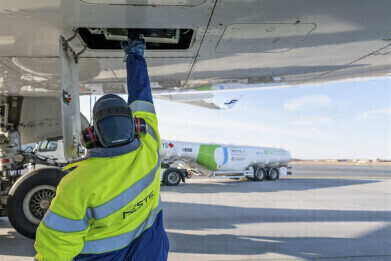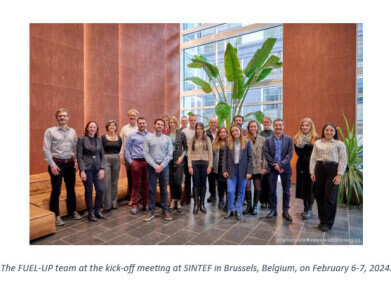Sustainable aviation fuel (SAF)
New pilot system to enable credible and traceable transfer of sustainability benefits from use of sustainable aviation fuel along the value chain
Oct 12 2023
Neste, the International Sustainability and Carbon Certification (ISCC), and global logistics company DHL Group have joined forces to pioneer and test a system aimed at enabling airlines, logistics service providers, and corporate end customers to accurately report their emission reductions achieved by using sustainable aviation fuel (SAF); the new initiative aims to reduce the carbon footprint resulting from air travel and transportation.
As part of this collaboration, the organisations embarked on a pilot program using ISCC’s. ISCC, is a highly reputable non-profit organisation with a well-known track record in supply chain certification; the organisation has developed a innovative system that tracks and transfers SAF use and its associated sustainability benefits, particularly in terms of greenhouse gas (GHG) emission reductions, through a scrupulously managed registry.
The ISCC Credit Transfer System provides total traceability of SAF transactions and their related sustainability benefits. This ensures that companies procuring SAF and airlines using this environmentally friendly fuel can make credible and transparent claims about the resultant emission reductions, thereby contributing to their climate targets. In addition, this system mitigates the risk of inaccurate sustainability claims and double counting of SAF volumes and their GHG emission curtailment. ISCC collaborated closely with key stakeholders in the aviation sector to develop this system, ensuring alignment with the requirements established by the Science Based Targets initiative's (SBTi) aviation guidance for SAF use in addressing organisations' value chain (Scope 3) emissions.
Neste, a major producer of SAF, conducted tests on this system in partnership with ISCC and DHL Group earlier this year. For DHL Group, SAF is a key component in achieving its 2030 Science Based Targets initiative (SBTi) approved decarbonisation goal, and ultimately, its 2050 net-zero target. DHL Group aims to achieve a remarkable level of 30% SAF use by 2030.
The pilot program involved the processing of the inaugural SAF transaction through the ISCC Credit Transfer System. Neste supplied DHL Group's airline, EAT, with ISCC EU certified SAF. The environmental attributes of these SAF volumes, including the achieved emission reductions, were registered as "credits" in the ISCC registry. This allowed EAT to claim a reduction in its direct emissions (Scope 1), with the corresponding Scope 1 credit being retired to prevent reuse. The Scope 3 credit for the indirect emissions reduction was transferred to DHL Group's registry account. As part of their GoGreen Plus lower-emission transport services, DHL Group could then credibly verify the emission savings achieved in their customers' value chain (Scope 3) emissions, retiring the corresponding SAF credit.
Prof. Dr. Gernot Klepper, Chairman of the ISCC Association, stated, “ISCC has developed the ISCC Credit Transfer System as a natural continuation of our established and globally used supply chain certification systems. With the ISCC Credit Transfer System, we provide a solution for traceable and credible Scope 1 and 3 emission reduction claims related to SAF use,”
Processing transactions through the registry, following ISCC-defined rules, benefits Neste, DHL Group, and their customers by ensuring complete traceability of SAF transactions and environmental benefits while preventing erroneous double counting of emissions reductions.
Jonathan Wood, Vice President Commercial and Technical Management from Neste's Renewable Aviation business unit, explained, “SAF is a key solution to reduce aviation related greenhouse gas emissions but it’s also critical for airlines, freight forwarders and shippers, and corporate end-customers to be able to report their SAF use credibly and transparently and related emission reductions. The new ISCC Credit Transfer System is a big step forward as it also integrates with existing sustainability certification systems,”
Following the successful pilot of the ISCC Credit Transfer System, the system is now open for public consultation and can subsequently be used by all companies such as airlines, logistics service providers, and corporate end-customers, committed to credible and transparent reporting of emission reductions from SAF usage.
Digital Edition
PIN 25.5 Oct/Nov 2024
November 2024
Analytical Instrumentation - Picturing Viscosity – How Can a Viscometer or a Rheometer Benefit You? - Sustainable Grease Formulations: Evaluating Key Performance Parameters and Testing Method...
View all digital editions
Events
Jan 20 2025 San Diego, CA, USA
Jan 22 2025 Tokyo, Japan
Jan 25 2025 San Diego, CA, USA
SPE Hydraulic Fracturing Technology Conference and Exhibition
Feb 04 2025 The Woodlands, TX, USA
Feb 05 2025 Guangzhou, China



















